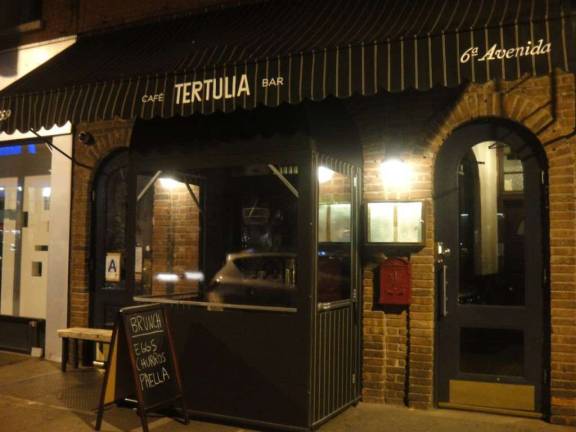Cooking Under a Big Tent

When some chefs adopt another culture, it's a crime. Tertulia is proof that there's room for everyone.
Picture an American chef. He falls in love with a cuisine from another country, travels to that country for a few heady months, takes copious notes (maybe studies with a few locals), then opens his own restaurant offering the real deal back here in the city. It's a common scenario these days; in a restaurant-dense economy like New York, the prospect of an untapped vein of culinary interest is hard to resist. It's also one that's hotly debated, with critics coming down hard on chefs who dare to move in on someone else's slice of the cultural pie.
That criticism almost always falls on restaurateurs who take on the cuisine of a group that has traditionally existed outside the fine-dining orbit. Think of Eddie Huang's beef with Marcus Samuelsson, an Ethiopian-born Swede who purported to bring old-school Harlem chic to his Red Rooster. Or Andy Ricker, whose gap year stint in Thailand led to his Pok Pok restaurants, at which authenticity is the watchword on everything from ingredients to tableware. But how many chefs are there running Italian restaurants who've never met a Silician nonna, let alone been raised by one? Can Keith McNally roll his Rs, and did that affect his ability to create the perfect French bistro in Soho?
Somehow, once the culinary conversation moves to Europe, cross-pollination becomes the norm. Studying with chefs in other countries is a badge of honor, rather than a back-alley entrance to someone else's party; the number of chefs who are riding the coattails of their stage period at Copenhagen's Noma alone could fill the three-story Times Square Olive Garden several times over. What's the difference? About 200 years of established practice is all that separates the two worlds; it's about time we acknowledged that passion and respect are all it takes for a chef ? any chef ? to try to step into another cuisine. Whether he's successful? That's up to the diner.
Thankfully for Seamus Mullen, he found his inspiration in Spain, a perfectly acceptable region for a young chef from New England to tour, fall in love with, and want to spend his career trying to recreate. It worked out for us, too, as Tertulia (tertulianyc.com; 359 6th Ave.), his take on the sidrerias of northern Spain, captures all of the right notes of those cheery public houses with food that is at times more essentially Spanish-tasting than what can be found there. Patatas bravas, for example, are usually dressed with a smoky red pimenton sauce and a bright, garlicky allioli; like so much pub food, the allure is in the condiments. But at Tertulia, the potatoes are coated in the paprika itself, building a crackly, spicy base of flavor atop which the allioli sings counterpoint, rather than carrying the show.
Wine flows from taps and is served in wide-bottomed tumblers; there is, of course, Spanish cider from a barrel, which tastes more like a vin jaune than the sugar-sweet Woodchuck of your youth. Ragged red brick and Moorish tiles line the walls, and the back corner is dominated by a tiled chimney and grill, on which the magic happens. Without smoking out the room, that grill captures all of the earthy, wild flavors of the north Atlantic coast in dishes as diverse as grilled prawns lightly dressed with olive oil and sea salt and a lamb shank that is braised first and dressed with Moorish flavors of sweet dried fruit and vinegar.
There is paella (technically Valencian ? breathe a sigh of relief that the authenticity police aren't around) in a shallow pan that allows for an admirable quantity of socarrat, the burnished crust of rice that is the true prize. And there is jamon and chorizo for days, presented lovingly on wooden boards or tossed in with chickpeas, Brussels sprouts, and more. But most importantly, there are large groups whose raised voices and laughter never grate, a front bar that can get crowded but never claustrophobic, and solicitous service that always feels genuine. That may be the hardest thing to replicate in the city, and Mullen has done it. Who cares where he was born?